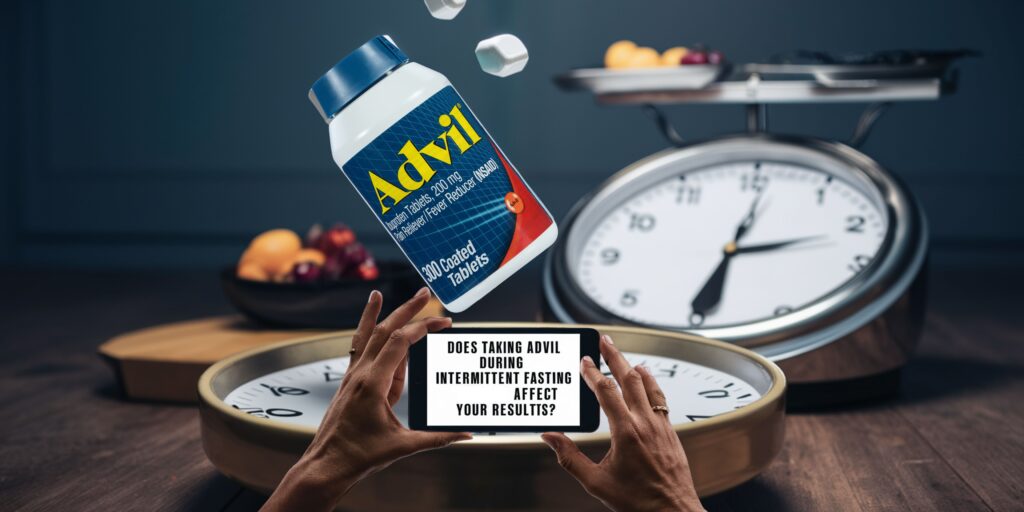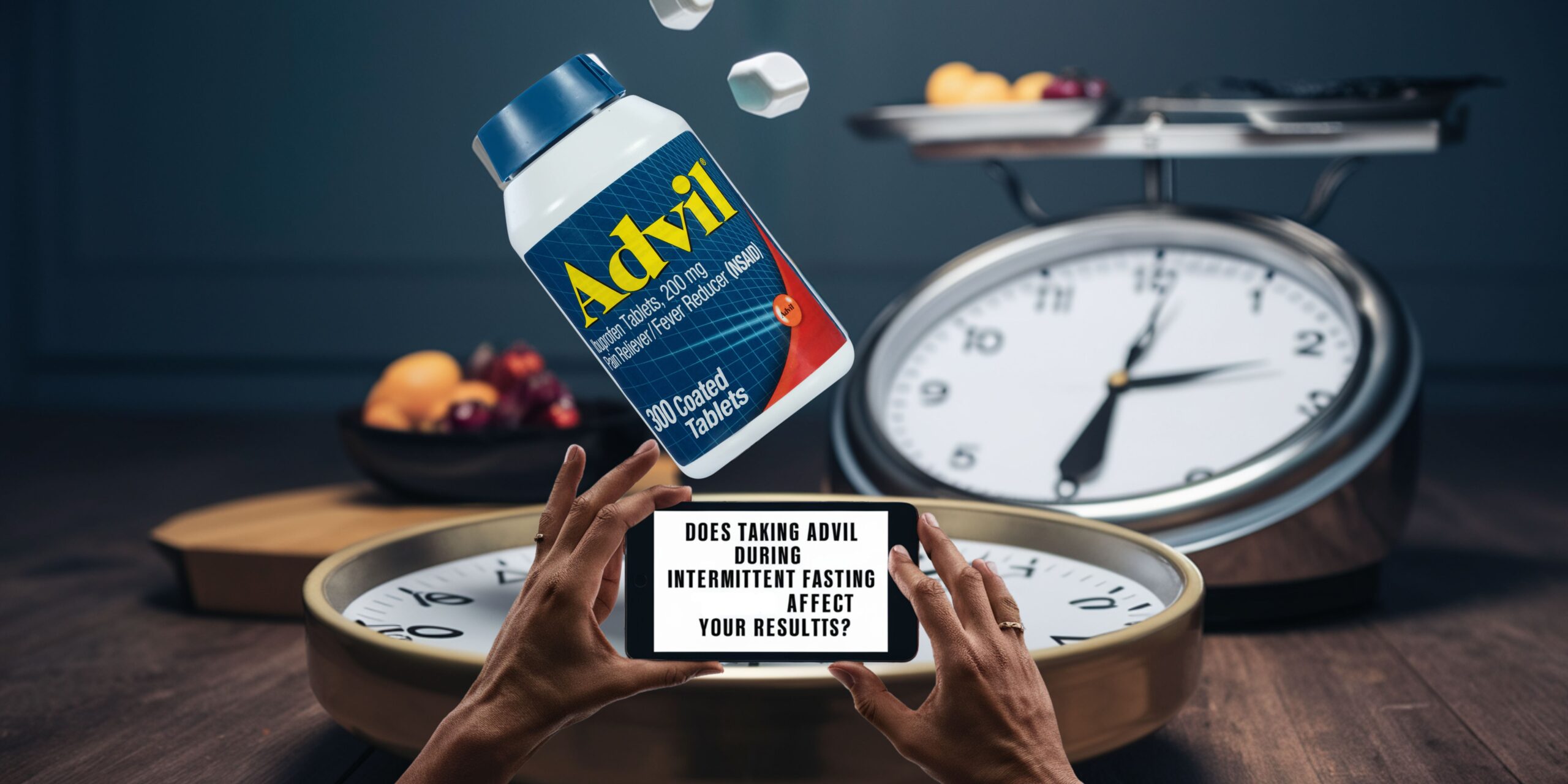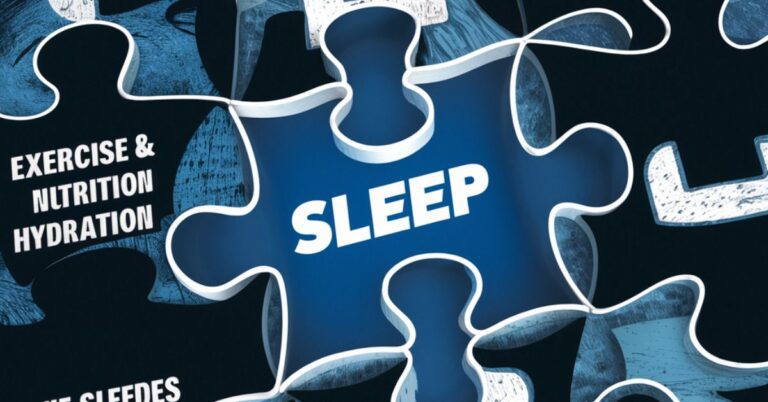Does Taking Advil During Intermittent Fasting Affect Your Results?
Intermittent fasting (IF) has become a popular health trend, praised for its potential to promote weight loss, improve blood sugar control, and enhance overall well-being. But what happens when you experience a headache or minor pain during your fasting window? Can popping an Advil (ibuprofen) throw your carefully crafted fasting plan off track? This blog delves into the science behind intermittent fasting and Advil use, exploring their potential interactions and offering guidance for making informed decisions.


Understanding Intermittent Fasting
Intermittent fasting is an eating pattern that cycles between periods of eating and fasting. It’s not a specific diet but rather a time-restricted approach to consuming calories. There are various IF methods, each with its own fasting and eating windows:
- 16/8 method: This popular approach involves fasting for 16 hours and restricting your eating window to 8 hours each day.
- 5:2 method: Here, you eat normally for 5 days of the week and restrict your calorie intake to 500-600 calories on the remaining 2 non-consecutive days.
- Eat Stop Eat: This method involves a 24-hour fast once or twice a week.
The benefits associated with intermittent fasting are numerous. Studies suggest it can:
- Aid in weight management by promoting calorie restriction and potentially increasing metabolic rate.
- Improve blood sugar control, potentially reducing the risk of type 2 diabetes.
- Reduce inflammation, a key factor in many chronic diseases.
- Enhance cognitive function and brain health.
The Role of Advil
Advil is a brand name for ibuprofen, a nonsteroidal anti-inflammatory drug (NSAID) commonly used to relieve pain, fever, and inflammation. It works by blocking the production of prostaglandins, which are hormone-like substances involved in pain and inflammation.
Advil is generally well-tolerated, but like any medication, it can come with side effects, especially when taken on an empty stomach. These can include stomach upset, heartburn, and nausea.
Advil and Digestion
The question of whether Advil breaks a fast hinges on what constitutes “breaking a fast.” In the strictest sense, some believe consuming anything other than water or black coffee breaks a fast. However, a more practical approach focuses on the impact on the body’s metabolic state.
Here’s what we know about Advil and digestion:
- Minimal Caloric Intake: Advil itself contains minimal to no calories, so from a purely caloric standpoint, it’s unlikely to significantly disrupt your fast.
- Delayed Gastric Emptying: Advil can slow down the emptying of your stomach, potentially extending your feeling of satiety. This might be beneficial during a fast but can also contribute to stomach upset.
- Potential Metabolic Effects: While research is ongoing, some studies suggest NSAIDs like Advil might slightly decrease insulin sensitivity, potentially impacting ketosis (the metabolic state where the body burns fat for fuel) during a fast.
Intermittent Fasting and Medication
If you’re taking medication, including Advil, during an intermittent fasting regimen, it’s crucial to prioritize safety and consult your doctor. Here are some general guidelines:
- Review with Your Doctor: Discuss your fasting plan and any medications you take with your doctor to ensure they don’t interact negatively.
- Adjust Medication Timing: If possible, consider taking Advil with food during your eating window to minimize stomach upset.
- Alternative Medications: Explore pain relief options that might be more suitable for taking on an empty stomach. Your doctor can advise you on safe alternatives.
The Scientific Perspective
Studies on the specific interaction between Advil and intermittent fasting are still emerging. However, some existing research offers insights:
- A 2014 study found that ibuprofen modestly decreased insulin sensitivity in healthy individuals. However, the study design involved continuous dosing, which might not translate to the occasional use of Advil during a fasting window.
- Real-life experiences shared by some intermittent fasters suggest occasional Advil use doesn’t significantly hinder their fasting goals. It’s important to note these are anecdotal accounts and may not reflect everyone’s experience.
Possible Side Effects
Taking Advil on an Empty Stomach
While Advil is generally safe for most people, taking it on an empty stomach can increase the risk of certain side effects. Here’s a breakdown of the most common:
- Stomach Upset: This is the most frequent side effect. The lining of your stomach is irritated by Advil’s action on prostaglandins, leading to nausea, heartburn, and indigestion.
- Heartburn: Advil can relax the lower esophageal sphincter, the muscular valve that prevents stomach acid from refluxing into the esophagus. This can cause a burning sensation in your chest (heartburn).
- Nausea and Vomiting: In some cases, Advil can trigger nausea and even vomiting, especially if taken on an empty stomach.
These side effects are usually mild and short-lived, but they can be unpleasant. To minimize them, consider taking Advil with a small amount of food or milk.
Long-Term Effects of Regular Advil Use
While Advil is a valuable pain reliever, regular use, especially at high doses, can lead to some long-term complications. Here are a few to be aware of:
- Stomach Ulcers: Chronic use of Advil can irritate the stomach lining, increasing the risk of developing stomach ulcers. This is particularly concerning for individuals with a history of ulcers or those taking medications that can irritate the stomach, like blood thinners.
- Kidney Problems: Long-term use of high doses of Advil can put strain on the kidneys, potentially leading to kidney damage or even kidney failure. This risk is higher for individuals with pre-existing kidney problems.
- Cardiovascular Issues: Studies suggest a small but increased risk of heart attack or stroke with high NSAID use. This risk is likely higher in individuals with existing cardiovascular conditions or those taking other medications that increase heart risk.
Important Note: It’s crucial to consult your doctor if you experience any persistent or severe side effects while taking Advil.
Interaction with Intermittent Fasting
The potential impact of Advil on intermittent fasting results is a topic of ongoing research. Here’s what we know so far:
- Minimal Calorie Intake: Advil itself contains minimal to no calories and likely won’t significantly disrupt your fast from a purely caloric standpoint.
- Delayed Stomach Emptying: Advil can slow down the emptying of your stomach, potentially causing you to feel fuller for longer during a fast. While this might be beneficial for managing hunger, it can also contribute to stomach upset.
- Potential Metabolic Effects: Some studies suggest NSAIDs like Advil might slightly decrease insulin sensitivity, potentially impacting ketosis (the metabolic state where the body burns fat for fuel) during a fast. However, the research is limited and further investigation is needed.
Overall: While occasional use of Advil during a fasting window might not derail your progress entirely, the potential for stomach upset and the possible impact on insulin sensitivity are considerations.
In the next section, we’ll explore some best practices for managing pain during fasting and offer alternatives to Advil.
Best Practices
Experiencing pain during a fasting window can be frustrating. Here are some tips to manage pain while staying on track with your intermittent fasting goals:
Natural Pain Relief Techniques:
- Heat or Ice Therapy: Applying a heating pad or ice pack to the affected area can help alleviate pain and inflammation.
- Rest and Relaxation: Getting enough sleep and practicing relaxation techniques like deep breathing or meditation can help manage pain perception and promote overall well-being.
- Stretching and Gentle Exercise: Light physical activity can improve blood flow and reduce muscle stiffness, contributing to pain relief. However, avoid strenuous exercise during a fast, as it can increase stress on your body.
- Staying Hydrated: Dehydration can worsen headaches and muscle aches. Ensure you’re drinking plenty of water throughout the day, even during your fasting window.
Dietary Considerations:
- Anti-inflammatory Diet: Prioritize anti-inflammatory foods like fruits, vegetables, and omega-3 fatty acids during your eating window. These can help reduce inflammation throughout your body and potentially lessen pain.
- Electrolytes: Maintaining electrolyte balance is crucial during a fast. Consider incorporating electrolyte-rich beverages or supplements, especially if you experience headaches or muscle cramps.
Alternative Pain Relief Options:
Several pain relief options might be more suitable for taking on an empty stomach compared to Advil:
- Acetaminophen (Tylenol): Unlike Advil, acetaminophen works differently and doesn’t irritate the stomach lining as much. However, it’s important to follow dosage instructions carefully, as exceeding the recommended amount can be harmful to the liver.
- Topical Pain Relief: Gels, creams, or patches containing pain relievers like lidocaine or menthol can be applied directly to the affected area for targeted pain relief without affecting your fasting state.
Remember: Always consult your doctor before starting any new medication or supplements, especially when on an intermittent fasting regimen.
When to Consult a Healthcare Professional
While managing pain during a fast is possible, there are situations where seeking professional help is crucial. Here are some red flags:
- Severe or persistent pain: If your pain is severe, worsens, or doesn’t improve with self-care measures, it’s important to see a doctor to rule out any underlying medical conditions.
- Fever: A fever accompanying pain can indicate an infection, requiring medical attention and potentially breaking your fast depending on the doctor’s advice.
- Sudden or unexplained pain: New or sudden pain, especially in the chest, abdomen, or head, warrants immediate medical attention.
- Pain accompanied by other concerning symptoms: If your pain is accompanied by other worrisome symptoms like nausea, vomiting, dizziness, or difficulty breathing, seek immediate medical help.
Remember, your doctor is the best resource for personalized guidance on managing pain during intermittent fasting. They can assess your specific situation, recommend safe pain relief options, and ensure your overall well-being remains a priority.
Conclusion:
The relationship between Advil and intermittent fasting is complex. While occasional use of Advil might not significantly disrupt your fast, the potential for stomach upset and impact on insulin sensitivity are factors to consider. By exploring natural pain management techniques, alternative pain relief options, and consulting your doctor when needed, you can navigate pain effectively while staying committed to your intermittent fasting goals.
FAQs
Does Advil break a fast?
There’s no definitive answer. In the strictest sense, some consider consuming anything other than water or black coffee to break a fast. However, a more practical approach focuses on the impact on your body’s metabolic state.
Advil itself contains minimal calories and likely won’t significantly disrupt your fast from a purely caloric standpoint. However, it can potentially:
- Delay stomach emptying, extending feelings of fullness but also increasing the risk of stomach upset.
- Slightly decrease insulin sensitivity, potentially impacting ketosis.
Can I take Advil before starting my fasting period?
Taking Advil with food during your eating window is generally recommended to minimize stomach upset. However, if the pain is severe and requires immediate relief, taking Advil before your fast might be necessary. Discuss this with your doctor for personalized advice.
What pain relievers are safe during intermittent fasting?
Here are some pain relievers potentially more suitable for taking on an empty stomach:
- Acetaminophen (Tylenol): Works differently than Advil and is less likely to irritate the stomach lining. Still, follow dosage instructions carefully.
- Topical Pain Relief: Gels, creams, or patches with lidocaine or menthol offer targeted pain relief without impacting your fast.
How does Advil affect ketosis?
Some studies suggest NSAIDs like Advil might slightly decrease insulin sensitivity, potentially impacting ketosis (the fat-burning metabolic state). However, the research is limited, and the effect might be minimal with occasional use.
Should I consult my doctor before taking Advil while fasting?
Yes, it’s crucial to consult your doctor before taking Advil or any other medication while fasting. They can assess your individual situation, recommend the safest pain relief options, and ensure your fasting plan aligns with your overall health goals.











